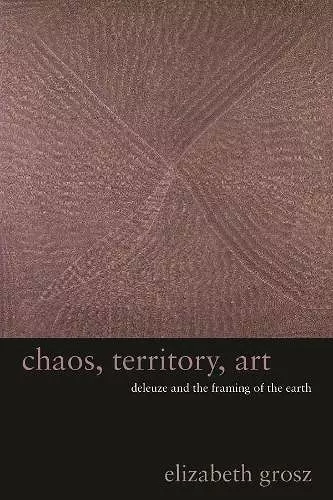Chaos, Territory, Art
Deleuze and the Framing of the Earth
Format:Hardback
Publisher:Columbia University Press
Published:22nd Jul '08
Should be back in stock very soon

Elizabeth Grosz's writing is at once clear and evocative. Her readings of Deleuze and Guattari are astute and judicious, opening their thought to practitioners of all the arts. Her use of Charles Darwin and Jakob von Uexkull is illuminating, and her approach to the evolution of the arts provides a refreshing alternative to the deterministic and reductionistic arguments of many evolutionary biologists and their enthusiasts in the field of aesthetics. I know of no other book that offers a similar view of the arts and their relationship to the natural world. -- Ronald Bogue, professor of comparative literature, University of Georgia
Argues that art, especially architecture, music, and painting, is born from the disruptive forces of sexual selection. This book approaches art as a form of erotic expression that connects sensory richness with primal desire. It argues that the meaning of art comes from the intensities and sensations it inspires, not just its intention.Instead of treating art as a unique creation that requires reason and refined taste to appreciate, Elizabeth Grosz argues that art-especially architecture, music, and painting-is born from the disruptive forces of sexual selection. She approaches art as a form of erotic expression connecting sensory richness with primal desire, and in doing so, finds that the meaning of art comes from the intensities and sensations it inspires, not just its intention and aesthetic. By regarding our most cultured human accomplishments as the result of the excessive, nonfunctional forces of sexual attraction and seduction, Grosz encourages us to see art as a kind of bodily enhancement or mode of sensation enabling living bodies to experience and transform the universe. Art can be understood as a way for bodies to augment themselves and their capacity for perception and affection-a way to grow and evolve through sensation. Through this framework, which knits together the theories of Charles Darwin, Henri Bergson, Gilles Deleuze, Felix Guattari, and Jakob von Uexkull, we are able to grasp art's deep animal lineage. Grosz argues that art is not tied to the predictable and known but to new futures not contained in the present. Its animal affiliations ensure that art is intensely political and charged with the creation of new worlds and new forms of living. According to Grosz, art is the way in which life experiments with materiality, or nature, in order to bring about change.
This wonderful and short book... continues her recent quest of recasting Darwinian biology within a Deleuzean and Nietzschean understanding of sexual difference. -- Arun Saldanha Environment and Planning
ISBN: 9780231145183
Dimensions: unknown
Weight: unknown
136 pages